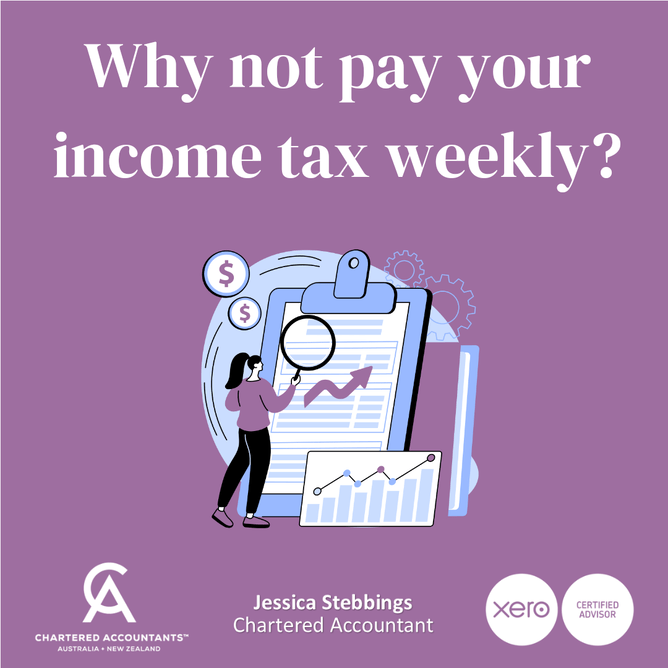Spreading out any large bill over a monthly or even weekly payment plan can be a lot easier on the cashflow. So why not do this with your income tax, instead of waiting for the standard Terminal Tax or Provisional Tax due dates?
The tax dates don't change. So if you want to setup regular payment amounts - do it. As long as your income tax is paid off before the due dates, and you are either a one-off Terminal Tax payer (income tax of less than $5,000 of tax per year) OR a standard provisional tax payer with income tax less than $60,000 per annum, you won't be charged interest or penalties, provided your payments are made before the due dates.
Here's a scenario:
You want to setup weekly payments to pay for your provisional income tax. Your accountant has prepared your income tax return for the year ended 31 March 2023 and has advised that you have Provisional Tax to pay for the year ending 31 March 2024 of $30,000, due over the below 3 instalments:
2024 Provisional Tax Instalment 1 - 28 August 2023 - $10,000 to pay
2024 Provisional Tax Instalment 2 - 15 January 2024 - $10,000 to pay
2024 Provisional Tax Instalment 3 - 7 May 2024 - $10,000 to pay
Total 2024 Provisional Tax - $30,000
Step 1: Calculating the weekly amounts:
If you are super onto it and start from the beginning of the financial year, eg. 1 April if you have a balance date of 31 March, it would be an easy calculation of $30,000 divided by 52 weeks to get your weekly amount of $576.92. If you are partway through a financial year, you just need to be mindful of making enough payments before the first instalment due date(s). For example, say you only have 8 weeks left before the first instalment due date of 28 August, you would need to pay at least $1,250 per week ($10,000 divided by 8 weeks) for the first 8 weeks, but then you could pay $576.92 from 28 August for the remaining weeks.
It's important to note that provisional tax is purely calculated by adding 5% to your income tax from the year before. If your income is expected to go up significantly or if you are expecting your income to be a lot less, you may want to consider paying more or less. If you are unsure, talking to your accountant and coming up with a tax plan might be a better option for you.
If your returns have not been prepared yet, and your not sure what your likely provisional tax will be, again a conversation with your accountant could help you come to a starting weekly amount to pay.
Step 2: Setting up Automatic Payments to IRD:
Go to the automatic payment function of your electronic banking and enter the following details
Payee Name: Inland Revenue Department
Account Number: 03-0049-0001100-27 (current as at 13 May 2023)
Particulars: Your IRD number. If you have an 8-digit IRD number, put a 0 at the beginning.
Payee Code: Account and (space) time period (DDMMYYYY). So for your 2024 and 2023 Income tax year payments the Payee Codes would be:
INC 31032024
INC 31032023
Reference: Leave Blank
And then finally enter in the instalment amounts to make. Some banks ask for total weeks to pay and some ask for a date range so you will need to update accordingly.
Step 3: Notify the IRD
You will also want to notify the IRD that you are making automatic payments. This is just in case you make an error in step 2 above and also so the IRD knows not to refund any amounts you have paid early, this use to be a minor problem in the past, but they are generally pretty good these days.
To notify the IRD, just login to your MyIR and in More Options.... send a message to the IRD saying something like "I've setup a payment plan to pay my income tax for the year yyyy of $xxxx.xx per week."
That's it.
If you would like a hand with any of the above please reach out.

